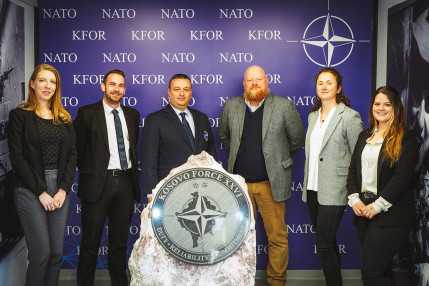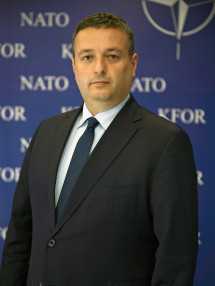KFOR: Introducing the Political Advisor’s Office
Text: Pál Bak (KFOR POLAD office political advisor) | Photo: First Lieutenant Barna Koncsek | 12:27 April 11, 2022Our article series gives an insight into the everyday tasks of those serving in the staff and leadership positions of the 26th rotation of KFOR, into their professional performance in an international environment.
The NATO-led KFOR mission is a tactical-level military operation; at the same time, carrying out today’s duties of the KFOR Commander (COMKFOR) is an activity that is much more political in nature. Day after day, the chief political advisor (POLAD) and the staff of the Political Advisor’s Office headed by him do their best to support COMKFOR in the continuously changing political environment.
The Hungarian command of KFOR is not only about the commander’s person, but also about providing the personnel supporting him. The chief political advisor – who is the head of the Political Advisor’s Office – is a position of outstanding importance, and for the first time, Hungary has been given the opportunity to fill it, alongside numerous other key positions.
The position of the political advisor is linked to the KFOR Commander; as a rule, the nation which provides the COMKFOR is the one that delegates the chief political advisor as well. The importance of the chief political advisor’s position is well reflected by the fact that after a national designation, he is directly appointed by the NATO Secretary General.
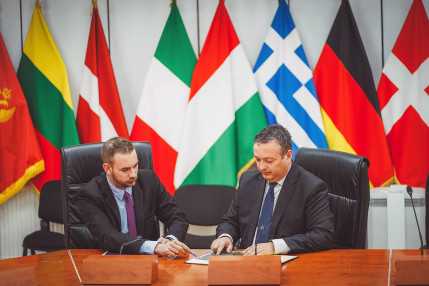
For the period of the Hungarian KFOR Commander’s tenure, the Ministry of Foreign Affairs and Trade designated Gyula Somogyi, a diplomat with variegated experience in the field of the Western Balkan region and security policy. In the interest of the precise performance of the tasks to high standards, following his designation, the chief political advisor already began to prepare together with the Hungarian KFOR command group in the autumn of 2020.
The chief political advisor regularly accompanies the KFOR Commander to his meetings, builds relationships and liaises with representatives of the international community and the local political actors, including international organizations and diplomatic corps. Beyond political advising in the strict sense, the POLAD also carries out classical diplomacy and protocol tasks to assist the commander and the command group.
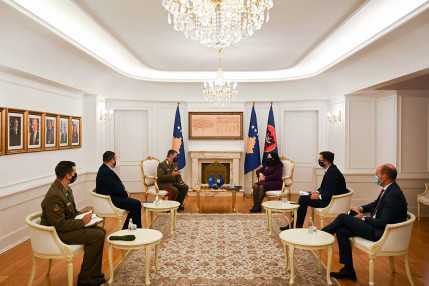
The political advisor’s multinational team makes it easier for him to get his job done. Also on the staff of the POLAD office are a Norwegian deputy political advisor, an assigned American administrative officer as well as three special advisors. The latter three positions are linked to KFOR troop contributing nations, so they are filled by Slovenia, Switzerland and Hungary.
The fact that the office works directly under COMKFOR – together with further (legal, medical and gender) advisors and their colleagues – signifies its special status. Except for the American soldier responsible for administration, all members on the staff of the office fill civilian positions, and generally perform their duties for a period of one year.
Pál Bak, a staff member of the Defence Policy Department of the Ministry of Defence is the Hungarian special political advisor at the POLAD Office. He also started preparing for the foreign mission together with the Hungarian command group in the autumn of 2020. Filling this position was not new for Hungary, since our country has provided one person for the chief political advisor’s office for several years. The currently assumed, dual Hungarian role is a good example of the traditionally excellent cooperation between the foreign affairs and the national defence spheres, as the members of the commander’s support group with three different institutional backgrounds (Ministry of Foreign Affairs and Trade, Ministry of Defence, Hungarian Defence Forces Command) join forces to work together for the successful execution of the mission.
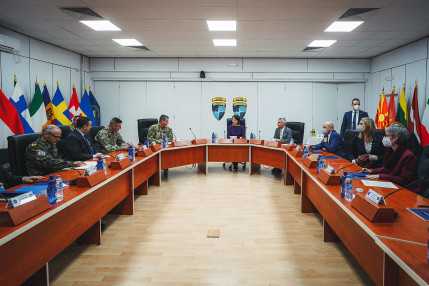
As Major General Ferenc Kajári has repeatedly emphasized, although KFOR is a tactical-level operation, it is exposed to political processes to a great extent. Consequently, the commander carries a significant burden, not only in terms of the day-to-day command of the mission, but also in terms of performing political-diplomatic tasks., In order to be able to support the commander and his staff to the greatest extent possible in this environment, it is essential that the chief political advisor and the staff of the office headed by him are up-to-date, accurate, innovative and have a critical and analytic way of thinking.
Besides all the above, the staff members of the POLAD Office participate in planning, developing and executive processes in KFOR, so that they can most efficiently support a deeper understanding and assessment of the political environment. Filling these positions does not only come with privileges but also with extraordinary responsibility and challenges.
In addition to advising the leaders of KFOR in matters “outside the camp”, the Political Advisor’s Office also pays attention to the characteristics of the twenty NATO and eight partner troop contributing nations, and provides them with support as they need it.
In addition to advising the leaders of KFOR concerning activities performed “out of the camp”, in doing its work, the Political Advisor’s Office also takes into consideration the characteristics of the twenty NATO and eight partner troop contributing nations.
